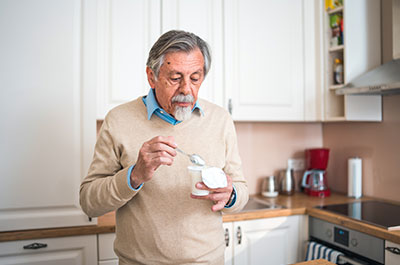Millions of people who have contracted COVID-19 have experienced a loss of smell and taste. “Some of these people have severe loss, meaning they’re not able to smell or taste anything at all,” says Omar Danoun, M.D., a neurologist at Henry Ford Health. “Others have mild to moderate loss of smell and taste, where they’re able to detect only strong aromas. Or they can only smell things close up.”
It's not known exactly why some people lose their sense of smell and others don’t, but it is known that when you contract COVID-19, the virus attaches itself to cells in your nose. In the process, it can damage these cells, leading to a loss of smell.
“The nerve cells in our nose are the boss—they process smells,” says Dr. Danoun. “But around each nerve cell are olfactory support cells—they nourish the nerve cells. Most of the time, when you lose your sense of smell, it’s because the virus has attacked these support cells. When these support cells regenerate (on average four to six weeks later; for some it takes longer) your sense of smell will return.”
Smell and taste are intertwined in our brain, so when you lose your sense of smell, you also lose your sense of taste. “The tongue can detect basic tastes like sweet, sour, savory and bitter, but the nose detects flavor,” says Dr. Danoun. “So if you lose your sense of smell and eat a strawberry candy, for example, you might know you’re eating something sweet, but you might not know that it’s strawberry flavored.”
How You Can Help Regain Your Sense Of Smell
Olfactory training (or smell training) can help stimulate the nerve cells in your nose, says Dr. Danoun. Here’s how it works:
- Line up four essential oils of your choosing. For example: oregano, lemon, eucalyptus and rosemary. If you don’t have essential oils, you can also squeeze a lemon, chop up a few pieces of oregano—use scents you have at home.
- Starting with the first scent, take gentle whiffs of it for 25 seconds. While you’re smelling it, imagine what the smell looks like, what it feels like. Recall a memory that involves this particular scent. “Memory and smell are tightly connected in the brain,” says Dr. Danoun. “Smell goes directly to the brain’s emotional center, including the areas responsible for processing emotion and memory. That’s why, for example, when you smell chlorine, it may remind you of swimming lessons. Olfactory training can teach the brain to remake connections back to specific scents.”
- Give your brain one minute to process that scent. When a minute is up, take gentle whiffs of the next scent for 25 seconds. Let your brain process that scent for a minute. Continue until you’ve smelled each of the four scents.
- Do this exercise twice a day, morning and night, for three months. If your sense of smell hasn’t fully returned after three months, find four new essential oils and repeat the exercise. “Time is very important for this exercise, as it takes time for the olfactory nerves to recover,” says Dr. Danoun. “They don’t regenerate every day. It’s like running a marathon. You need to train slowly and persevere.”
It’s also helpful to track your progress. Keep a journal of what you can smell and when, as your sense of smell will likely come back in stages. “Even if it takes a while, the good news is that if you regain any hints of smell, it’s just a matter of time until it fully returns,” says Dr. Danoun.
If You Still Haven’t Regained Any Sense Of Smell
If you have absolutely no sense of smell after six weeks, visit your doctor. Underlying issues could inhibit recovery, such as untreated allergies, sinusitis or an infection in the nose. If you smoke, you should stop right away, as smoking can hinder recovery.
Other treatments to aid smell recovery are being tested—such as nasal steroids to ease inflammation and vitamin A to stimulate cell regeneration—but neither are conclusive, says Dr. Danoun. And contrary to what the Internet might say, Dr. Danoun strongly cautions against sticking garlic cloves or anything else up your nose.
“If you don’t have an underlying issue and you continue to have zero sense of smell, it could mean that a main nerve—not a support cell—was significantly damaged, so we have to wait for it to grow back,” says Dr. Danoun. “That’s what we see with any neurology issue, like a stroke, for example. It takes time to recover. For some, it could take a year. That’s just the nature of nerves.”
Are you experiencing long-haul COVID-19 symptoms? Learn more about Henry Ford’s COVID-19 Recovery Care Clinic.
To find a doctor at Henry Ford, visit henryford.com or call 1-800-436-7936.
Dr. Omar Danoun is a neurologist with Henry Ford Health. He sees patients at Henry Ford Hospital in Detroit and Henry Ford Medical Center in Taylor.



